Announcing: Catalog #290 (for January, 2020) is now available…
January 7, 2020 by GuyHeilenman · Leave a Comment
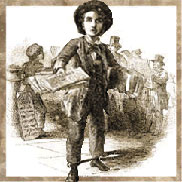
- Catalog 290 (in its entirety)
- Noteworthy Catalog 290 ($250+)
- Combined Catalogs (current, w/ remnants of previous)
Don’t forget about this month’s DISCOUNTED ISSUES.
(The links above will redirect to the latest catalog in approx. 30 days, upon which time it will update to the most recent catalog.)
Christmas-themed poems from 1850 – Food for thought…
December 24, 2019 by GuyHeilenman · Leave a Comment
Earlier this year I came across a December 21, 1850 issue of Household Words – a publication “conducted” by Charles Dickens, which actually contained an original work by him titled “A CHRISTMAS TREE.” Although this was his publication, the majority of the contributions within were typically written by others. While perusing the issue I came across a set of Christmas-themed poems which stirred my heart. Hopefully you will also find them moving. Enjoy.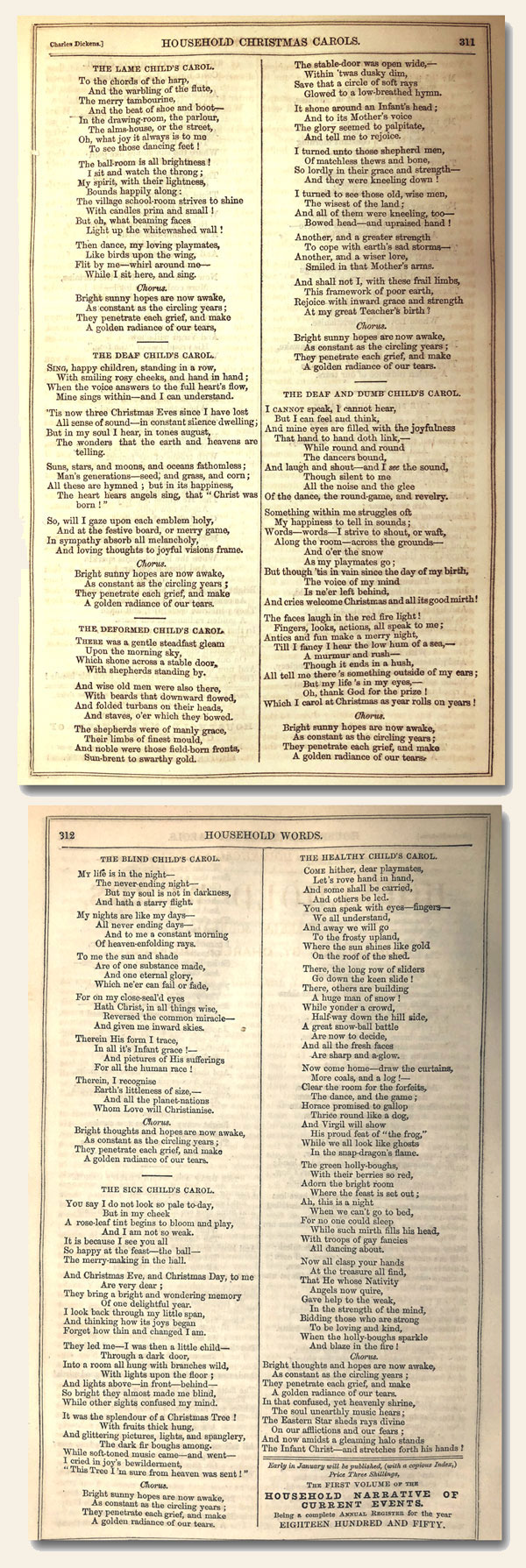
I’m New Here: Week Forty…
December 6, 2019 by Stephanie Williams · Leave a Comment
 At the start of this week, I was a bit hard-pressed to think of something new I learned. Winter dramatically closed the Thanksgiving celebrations in our part of the world, and I spent two days trying to determine the best window for travel within two storm systems. Consequently, I arrived halfway through the day Monday and have been scrambling to catch up with the December crush of orders ever since. Yesterday I decided that this was a good time to reflect on all the things that have become old hat to me, and how much I enjoy the rhythm of this world of old newspapers and the folks that value and collect them. However, the end of the day brought home a new lesson.
At the start of this week, I was a bit hard-pressed to think of something new I learned. Winter dramatically closed the Thanksgiving celebrations in our part of the world, and I spent two days trying to determine the best window for travel within two storm systems. Consequently, I arrived halfway through the day Monday and have been scrambling to catch up with the December crush of orders ever since. Yesterday I decided that this was a good time to reflect on all the things that have become old hat to me, and how much I enjoy the rhythm of this world of old newspapers and the folks that value and collect them. However, the end of the day brought home a new lesson.
A quick search of the internet archive yields a total of 1,355 works that are about Harriet Tubman. Many titles are children’s books, by which young people have learned of Tubman’s many missions to liberate somewhere between 70 and 300 slaves, with heroic disregard for her own precarious freedom. Her name is closely associated with the Underground Railroad, and she is credited with the altered route into Canada in response to the Fugitive Slave Law of 1850.
And yet.
This week we discovered a report of her death in “The Omaha Bee” for March 11, 1913, out of Nebraska. It is outrageously brief, and bewilderingly sparse in its acknowledgement of the North American 1800’s “Moses”.
The following is what Tim wrote for an upcoming catalog listing:
Page 3 has a somewhat inconspicuous report on the near death of the famed Harriet Tubman.
The report is headed: “Aged Negress Friend Of Abraham Lincoln Dying” and reads: “Harriett Tubman, a colored woman 95 years old, who is said to be a friend of Abraham Lincoln and Secretary of State William H. Seward, and who was associated with John Brown in anti-slavery work, is dying here of pneumonia.“
A curiously brief report giving her extraordinary life. A notable that of the many volumes of newspapers in our inventory this is the only report of her death (or nearly so) that we could find.
The new thing I learned this week is that a newspaper can only report on things to which the editorial staff is paying attention, or finding noteworthy. This seems more than a bit disconcerting, but then again I may have had too many Thanksgiving treats.
I’m New Here: Week Thirty-Nine…
November 27, 2019 by Stephanie Williams · Leave a Comment
 Sometimes rabbit trails lead to revised destinations – particularly those that meander through the annals of history. This week is a big deal on the US calendar because of colonists and survival and a heritage of gratitude…and I am a person full of thanks this year, as I have been much of my life.
Sometimes rabbit trails lead to revised destinations – particularly those that meander through the annals of history. This week is a big deal on the US calendar because of colonists and survival and a heritage of gratitude…and I am a person full of thanks this year, as I have been much of my life.
I obtained permission from Guy to be a bit personal in my post, which he graciously granted, but a communication with a favorite collector in NYC derailed my reflection. Ms. P told me about Evacuation Day, which commemorated the rousting of the British troops from their occupation of New York City following this nation’s fight for independence from England. I had never heard of the liberation of NYC, let alone the celebrations that occurred annually until Lincoln’s Thanksgiving Proclamation co-opted the seasonal celebrations. To be honest, I had never considered the duration of conflict following the 1776 declaration. Anyway, this information came to light in a peripheral way, and the collector who brought it to our attention, attended this year’s anniversary hoopla in the city that was liberated.
It’s a privilege to learn from the staff here, as well as those who are ordering papers. The collecting community is made up of a broad spectrum of interest and study, and I get to glean from the riches that move through the Rare and Early Newspapers archives.
I am thankful for the people who envisioned the United States of America — this great experiment. I am thankful for those who kept their convictions through a long, wearying stretch of conflict, and I am thankful for families and communities who continued to manage the stuff of life through the political upheaval.
If you have some time over the upcoming holiday, our catalog is much more fascinating than any Black Friday special. Whether you find the perfect gift for yourself or another, the time spent perusing the pages is a treat all by itself.
Cheers!
Announcing: Catalog #288 (for November, 2019) is now available…
November 4, 2019 by GuyHeilenman · Leave a Comment

- Catalog 288 (in its entirety)
- Noteworthy Catalog 288 ($250+)
- Combined Catalogs (current, w/ remnants of previous)
Don’t forget about this month’s DISCOUNTED ISSUES.
(The links above will redirect to the latest catalog in approx. 30 days, upon which time it will update to the most recent catalog.)
I’m New Here: Week Thirty-Six…
November 1, 2019 by Stephanie Williams · Leave a Comment
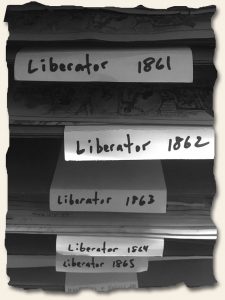 This week I discovered another section of the archives previously unexplored — actually, I didn’t even realize it was there.
This week I discovered another section of the archives previously unexplored — actually, I didn’t even realize it was there.
The walls in these connected buildings are shelved from floor to ceiling, as are the aisles and corridors. Inside those rigid 15′ dividers are movable racks that provide another layer of coordinates for filing archival folders of old and rare newspapers. It was here, highlighted by the angle of the tag, that I saw the title and date of voices for abolition. The Liberator issues that are housed here go as late as 1865, but I was interested in the ones that preceded the Emancipation Proclamation. What was being written and discussed by this publication from the “Anti-Slavery Office” in Boston in 1859? What was the tone prior to that April bombardment that marked the start of the Civil War?
The rag paper is full-sized (“folio”, in fact) and consists of four pages, mostly devoted to telling the stories of injustice and accounts that should provoke outrage. Headed by an illustration intricately representing people divided into groups based on the color of their skin, a banner curves along the bottom proclaiming, “THOU SHALT LOVE THY NEIGHBOR AS THYSELF” while a sign above a wooden structure crowded with human beings advertises, “Slaves, Horses & Other Cattle In Lots To Suit Purchase.” I feel the effectiveness of the graphics, of the pleading tone in the “Letter to Southern Ladies” and the headline which queries, “Shall Massachusetts Be Slave-Hunting Soil?” But what surprises me the most in this new acquaintance was the attitude toward the forerunner of Abraham Lincoln. A full front-page column is headed “PRESIDENTIAL FALSIFICATIONS”, and pulls no punches in its criticism of James Buchanan’s avoidance of the situation with the Free State Men of Kansas and the powerful politicians whose support of Slavery led to an effort summarized with, “The Missourians openly exulted in the sure prospect they had of making Kansas a slave state, in spite of the Free State men.”
I am looking forward to delving into the dates that discuss the events that followed — in all the permutations and compromises and regrets and triumphs. And I can’t help but wonder how much of a change anyone could have honestly expected after such a long period of such passionate division.
I’m New Here: Week Thirty-Five…
October 25, 2019 by Stephanie Williams · Leave a Comment
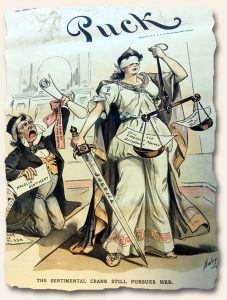 Sometimes I think that the constant hum of political discourse is unique to our time. Certainly, the tone is billed as uniquely vitriolic – in stark contrast to the bucolic days of yore. Except, I keep uncovering these eviscerating denouncements of a certain elected leader, or particular view, or specific cause, or controversial vote – with all the surrounding discussion and debate. The only difference I can see is that a certain level of pride seemed to stamp each public statement – as if a political position was strengthened by dissent. These days, nearly as much time is spent disassociating from one’s words as in the pontificating.
Sometimes I think that the constant hum of political discourse is unique to our time. Certainly, the tone is billed as uniquely vitriolic – in stark contrast to the bucolic days of yore. Except, I keep uncovering these eviscerating denouncements of a certain elected leader, or particular view, or specific cause, or controversial vote – with all the surrounding discussion and debate. The only difference I can see is that a certain level of pride seemed to stamp each public statement – as if a political position was strengthened by dissent. These days, nearly as much time is spent disassociating from one’s words as in the pontificating.
Adding a second distinguishing feature, this week I discovered the satirical Puck – begun in Germany and published in America in 1877. Interestingly, the founder collaborated with the renowned Leslie’s Illustrated prior to making the transition. Headed with the Shakespearean character’s wry commentary, “What fools these mortals be,” the clever magazine takes the tone of an outside, slightly mocking, observer.
The one I selected for perusal deals with the Justice System on the cover, and New York’s participation in the World Fair of 1839. A brief glance at the latter conveys a fairy tale worthy, beautifully colored double page centerfold that on closer inspection mocks the greed associated with the exposition and its participants.
It’s an elevated tone, when compared with the shrill modern volume on television and radio. Somehow, satire is more palatable to me — a velvet glove of watercolor illustration covering the iron fist of debate in a place where freedom of speech was so highly esteemed that it was almost an art form.
I’m New Here: Week Thirty-Four…
October 18, 2019 by Stephanie Williams · Leave a Comment
Today’s post is a bit harried because Guy was away for a few days. There is nothing like his absence to bring home to me how much I still have left to learn. Thankfully, he has returned and no one was irrevocably distressed by my continued ineptitude — which was blatantly apparent without his buffering.
 That said, I juggled as successfully as I could, and in the process found a sphere of knowledge of which I have somehow remained ignorant. The covers of Harper’s Weekly publications are often pen and ink constructions that are balanced and aesthetically appealing. Many collectors purchase these to frame and subsequently decorate walls and offices. An issue from 1859 passed under my gaze while fulfilling a request that had been paired with a name unfamiliar to me. The collector was searching for Garibaldi reports. As I was completely unfamiliar with the name, my shipping room buddy brought the June 18, 1859 Harper’s to my desk before commencing his painstaking shipping process.
That said, I juggled as successfully as I could, and in the process found a sphere of knowledge of which I have somehow remained ignorant. The covers of Harper’s Weekly publications are often pen and ink constructions that are balanced and aesthetically appealing. Many collectors purchase these to frame and subsequently decorate walls and offices. An issue from 1859 passed under my gaze while fulfilling a request that had been paired with a name unfamiliar to me. The collector was searching for Garibaldi reports. As I was completely unfamiliar with the name, my shipping room buddy brought the June 18, 1859 Harper’s to my desk before commencing his painstaking shipping process.
Clearly, I have been missing out. This “famous Italian patriot whose exploits on the slopes of the Alps are at present in every one’s mouth” was featured on the full front page, and continued onto one inside column. His visage is coldly angular, and his narrowed eyes appeared to find me across the length of my desk. My reaction must have been noteworthy, because an hour or so later Mike brought me a different date for that same title. “This artist had a kinder interpretation,” he said as he carefully placed another Garibaldi side by side with the first. And, the difference was so pronounced I spent a bit of time looking for the minute changes that dramatically influenced the whole.
Then I thought of all the people who search out issues containing Lincoln portraits, or a date among the seemingly unending eight years of Teddy Roosevelt covers. How funny it is to realize that our collective views of historically foundational people have been based on the interpretation of artists! Based on the shape of Joseph G.’s eyes, I suspect that some of them had a distinct bias that has unconsciously colored our perspective.
Even with my reasoning braced against my imagination, I find the introductory paragraph to the report does nothing to soften the aggressive life chosen by this commander. “Joseph Garibaldi is the type of gallant soldier of fortune, to whom the excitement of war is a necessity; but when his country’s opportunity arrives, is never found wanting among her defenders.”
I’m New Here: Week Thirty-Three…
October 11, 2019 by Stephanie Williams · Leave a Comment
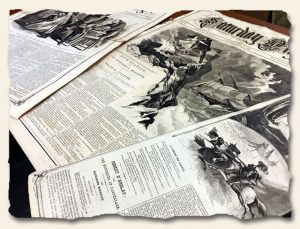 This week, while pulling issues that contain Emily Dickinson death notices, I read about the first public appearance of Dr. Oliver Wendell Holmes and also the institution of the Income Tax. As this was in 1886, I was surprised at the latter. Actually, I was surprised to see so many famous names and events in just a ten day span within that May. Oscar Wilde was hosting parties, Chicago was caught up in the Haymarket affair, and Coca-Cola was invented by a pharmacist. The rabbit trail I chose to follow (after investigating this whole Federal Income Tax thing that has historically been attributed to Woodrow Wilson’s presidency almost thirty years later) began with the following words to the Editor of the New York Times: “Mr. Putnam’s remarks on the impropriety of republishing [Washington] Irving’s works in their unrevised form, have but one fault; they are not strong enough.”
This week, while pulling issues that contain Emily Dickinson death notices, I read about the first public appearance of Dr. Oliver Wendell Holmes and also the institution of the Income Tax. As this was in 1886, I was surprised at the latter. Actually, I was surprised to see so many famous names and events in just a ten day span within that May. Oscar Wilde was hosting parties, Chicago was caught up in the Haymarket affair, and Coca-Cola was invented by a pharmacist. The rabbit trail I chose to follow (after investigating this whole Federal Income Tax thing that has historically been attributed to Woodrow Wilson’s presidency almost thirty years later) began with the following words to the Editor of the New York Times: “Mr. Putnam’s remarks on the impropriety of republishing [Washington] Irving’s works in their unrevised form, have but one fault; they are not strong enough.”
It is Autumn with a capital “A” in the northeast United States where, flanked by hilly vistas of multi-hued splendor, every street corner proclaims this the month of Hallowe’en. Washington Irving, author of the famous ghost story “The Legend of Sleepy Hollow”, could easily have been one of the serialized authors featured in the 1869 “Saturday Night” issues I have been pulling for a Philadelphia area collector. And October is definitely the time of year in which strange, extraordinary and macabre stories would have provided thrilling weekend entertainment to a 19th century culture blessedly devoid of electronic clamor.
I didn’t know about Irving’s first published work, or the misinformation campaign to hype interest prior to the release of A History of New York. I read about his “Knickerbocker” alter ego whose fictitious disappearance sparked a national following. This moniker influenced sports teams, architectural structures, social groups, and even a toy company. To this day, a resident of Manhattan is a Knickerbocker — nicknamed after a man who never was.
So, I am thankful for the censure that drew my attention away from the tax tables and the following words of “THE NEW INTERNAL REVENUE LAW. Topics of Interest to Everybody”:
Among these the Tax and Tariff laws are prominent, possessing an interest for every one, inasmuch as they most sensibly affect the cost of living, enhancing the prices of everything we eat, drink, or wear, adding to the value of articles of both necessity and luxury. The Tax law especially appeals directly to our pockets; and we find that a share of our profits from manufacturing any article, as well as a proportion of the income which we annually receive, is due to the Government.
I would much rather consider impropriety of a literary kind.
Announcing: Catalog #287 (for October, 2019) is now available…
October 1, 2019 by GuyHeilenman · Leave a Comment

- Catalog 287 (in its entirety)
- Noteworthy Catalog 287 ($250+)
- Combined Catalogs (current, w/ remnants of previous)
Don’t forget about this month’s DISCOUNTED ISSUES.
(The links above will redirect to the latest catalog in approx. 30 days, upon which time it will update to the most recent catalog.)




